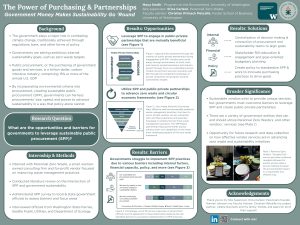The Power of Purchasing and Partnerships: Government Money Makes Sustainability Go ‘Round
Government procurement is a trillion dollar industry with a high carbon footprint, yet it holds the potential to combat climate change in a unique way that policy alone cannot. U.S. governments are setting aggressive sustainability goals and focusing on policy implementation, but have struggled to improve internal operating sustainability. This study aims to identify the opportunities and challenges associated with leveraging procurement to facilitate sustainability. To accomplish this task, I interned with Perennial Zero Waste and collected data on topics of sustainability, procurement, and zero waste through surveys and interviews of government officials. Additionally, I conducted a literature review of current opportunities and barriers around sustainable public procurement (SPP), as well as its potential to achieve zero waste goals and engage with vendors. Findings indicate that SPP is an avenue to create public-private partnerships (PPPs) for the benefit of sustainable government operations and improved waste management, advancement of social initiatives, and growth of green industries, yet it remains underutilized in the U.S. due to various barriers. Through internal policy creation, stakeholder engagement, innovation, and use of available resources, barriers can be overcome to realize the numerous benefits SPP has to offer. These findings are significant to my host organization because there are opportunities for their various environmental services to be utilized in the government sector through a PPP that benefits both parties substantially. Understanding the potential of SPP to enhance sustainability efforts will allow for governments to improve operations by engaging with vendors like Perennial Zero Waste.
